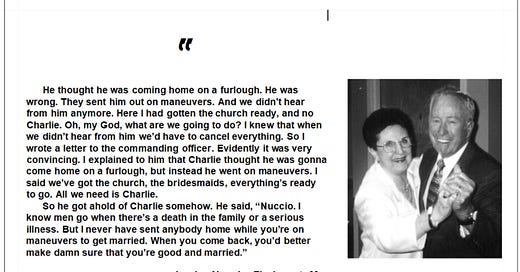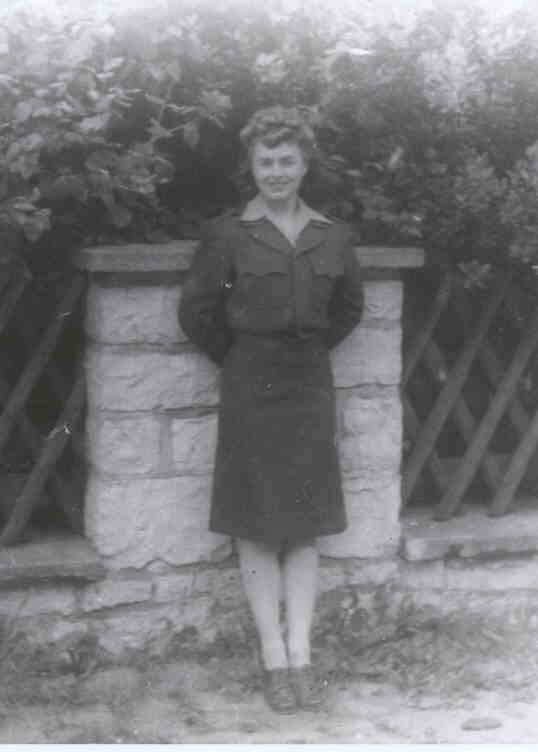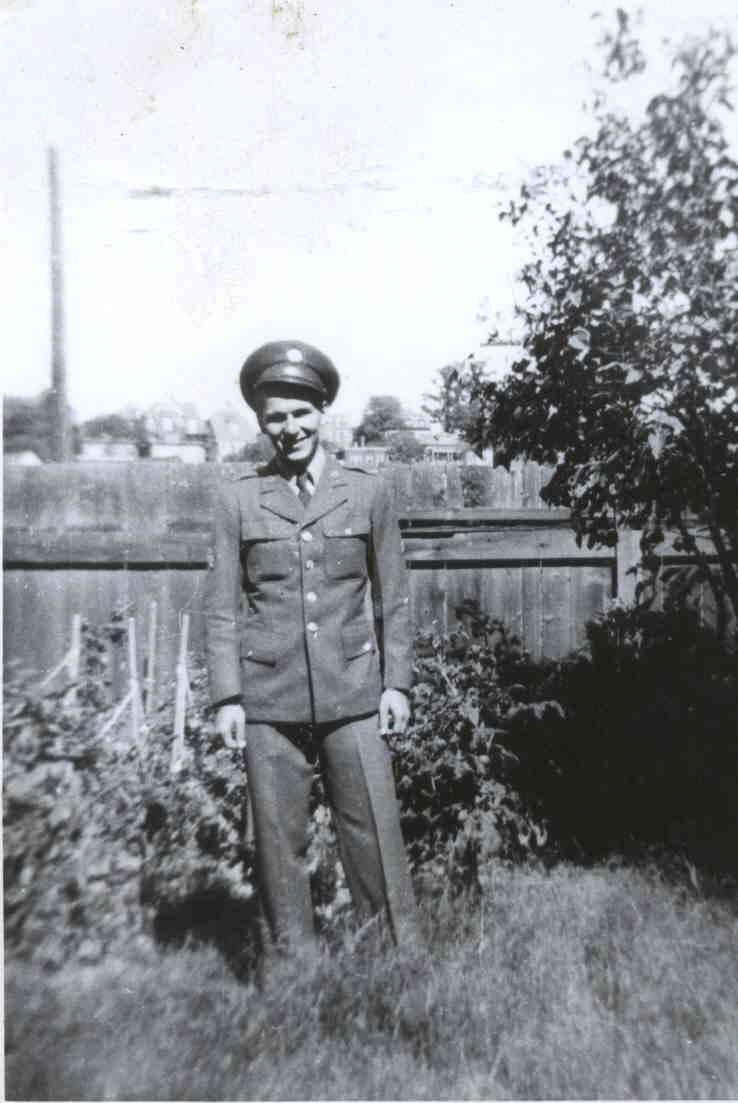Charlie and Louise: A Love Story
"It makes you feel like you've got something to come back to if you make it."
“How did you and Charlie meet?” I asked Louise Nuccio at a reunion of the 712th Tank Battalion, most likely around 1991 or 1992.
“I was very young, 15, and he was 20,” Louise said. “We met at a school dance, and we danced. Then I didn’t see him again for four to six months, at a wedding, and he recognized me, and asked me to dance, and that was it. He came over to the house, and of course I was only 15; I was in high school. My mother knew his parents years ago in Italy. In fact, my mother saw his parents get married in Italy. And when they get married over there, they walk the streets, the bride and the groom, and the family follows, very neat. Maybe the custom is still like that, I’m not sure.
“So he asked me to marry him and I told him I was too young, I’m a kid. I was 15. Then he proposed, and at 16 we got engaged at Christmastime, and then I married him when I was 17. He was called in the Army right after our engagement, and he was really unhappy. He didn’t say “I hate to go into the service,” but “Just when I found the girl I want, I have to go.” That’s what he was upset about. Not having to fight for his country, that wasn’t it, it was just that he got drafted after he got engaged to me.
“So then he went into the Jefferson Barracks. I forget now where they started out at, it’s so long ago. At Fort Benning, Camp Gordon, Fort Jackson, so after he was in the service 10 months he sent a telegram to me saying, “I’m coming home. Get ready. We’re going to get married.” Here I was under age, and I had nothing prepared. I didn’t know what to think. So my parents said, “Okay.”
“He didn’t say ‘Can we get married?’” I asked.
“Just like it was a command,” Louise said. “Since he was in the service I thought it was a command, “We’re getting married.” He thought he was coming home on a furlough, just a short furlough, a few days. He was wrong. They sent him out on maneuvers. And we didn’t hear from him any more. Here I had got the church ready, and this and that, and no Charlie. Oh, my god, what are we going to do? I don’t know how, I knew that when we didn’t hear from him we’d have to cancel everything. So what I did, I wrote a letter to the commanding officer, and evidently it was very convincing. I explained to him that Charlie thought he was going to come home on furlough, but instead he went on maneuvers, and I said, ‘We’ve got the church, the bridesmaids, everything is ready to go. All we need is Charlie.’ So he got ahold of Charlie somehow. He said, ‘Nuccio, I know men may go when there’s a death in the family, or a serious illness, or whatever. But I never have sent anybody home while you’re on maneuvers to get married.’ So he said, ‘When you come back, you’d better make damn sure you’re married.’
“So he came home, and I mean he thought there’s nothing to it, but there is a lot to a wedding. We got married on a Wednesday, and he was only home for three days, and he had to go back on maneuvers. And that’s how we got married. This was on July 28 that we were married. In October, after the maneuvers were over, he did get a furlough, and he was home maybe a week, and I went back with him. We had to find a place for me to stay, and in those days people were renting out their rooms because it was almost impossible, because there are not a whole lot of hotels. And I was just a kid, never been away from home. And there was a place that the veterans could go, and they would guide you, I forget what it was called...”
“Like the USO?” I asked.
“Something like that,” Louise said. “So they found us a place to stay. And we were very, very fortunate that the place we went to was a nice couple that was renting out their rooms. So he came home, I think it was around October, and then I went back with him on the train, and we found a room. I think we went to Augusta, Georgia; in fact I’ve got some pictures of the couple; they were 55 at the time but of course they looked older. In those days if you were 50 you looked old. Today if you’re 50 you don’t look old. The couple became very attached to me right away because they had a daughter; they lost a daughter when she was very young, and I kind of reminded them of the daughter, and they knew I was so young, and I didn’t know anything about, where am I? What am I doing here? So we stayed with them for a couple of months, and we became very, very close. When I was young I was very interested in cosmetology, that’s what I took in high school, although they changed my major to sewing which I went into later on in life.”
“Cosmetology is what?” I asked.
“A beauty operator. You know, hairdresser, beauty operator, cosmetologist. It covers a lot of things. Facials, and all that stuff. I went to a technical high school and I loved it, I really did, I got a lot out of it.
“Then one by one we were seeing men being called for overseas duty, and Charlie was transferred then from Augusta, Georgia, to South Carolina, I forget what, Camp Gordon, was that in South Carolina? And we found another couple that rented out a room. And I was very cold in South Carolina during the wintertime, that must have been January by then, in 1944, because we got married in ’43, and it was very cold. So I got a job. He came home just like a man from his job, he left early in the morning and he would come home by 5:30, and I had kitchen privileges. I did know how to cook at that age, so they gave me kitchen privileges. I didn’t really have any money to eat out. So I got a job at a five and dime store; they don’t have those any more. I worked up until, I knew that any day there would be a call for him for overseas duty, and it came abruptly. I mean, I got the phone call, ‘Well, this is it. We’re leaving’
“I said, ‘When?’
“He said, ‘Now.’
“And I said, ‘You mean, I won’t see you anymore?’
“He said, ‘No.’
“So I boo-hooed and all that stuff, you know. He said, ‘But don’t go home for a couple of days because it may be canceled, and then maybe we’ll go another time.’ So I stayed. Now, I’m not really supposed to tell this story but since the war is over, even Sam Calandro said, ‘You did that?’
“He had made arrangements with someone, I don’t know who it was, to let him go to come to see me one last time, and I didn’t expect him. I was sitting, by that time they let me sit in their living room, all there was in there was a radio in those days. I heard footsteps, and I recognized his footsteps. I said, ‘Charlie, it can’t be.’ He was restricted from going anywhere. ‘How did you get here? What are you doing here?’
“And he said, ‘I got someone to let me out, but I have to be back.’ They only gave him a couple of hours. But he said, ‘I had to come back and see you one more time because I don’t know if I’m going to come back or not.’
“And I said, ‘Well, let’s hope for the best.’
“So then he did leave early that morning. I stayed another day or two. I think he could make one more phone call to tell me, ‘Yes, this is it. Go home.’
“So that’s about it. Oh, there’s a lot more in between stuff that’s not that interesting, these are kind of the highlights of it.”
“What kind of stuff is not so interesting?” I asked. “I find everything interesting.”
“Well, finding a place to stay,” Louise said. “We found a place somewhere in Georgia that when the lights were on we didn’t see anything, and when the lights were off and then turn the lights back on, there were things crawling everywhere.”
“Roaches?”
“Oh, you wouldn’t believe it. I jumped out of that bed and I said, ‘I’m going to go home or you’re going to find another place, but I cannot stay here.’ So through this USO thing we told the people we were renting from that we couldn’t stay there. This was 11 o’clock at night. ‘You didn’t tell us that you had all these creepy crawlers.’ So then they found us this real nice house, clean, really nice. But that was one of the not nice things about ... It was hard. I didn’t have any money and he didn’t have any money, but my parents sent a few bucks. Then I got a job making 22 cents an hour at the five and dime. I worked behind a counter where they were selling greeting cards at that time, and other things, stationery. Things of that nature. They have a lot more now, but that’s what I was doing.”
“I was married July 28, 1943,” Chalie Nuccio said when I interviewed him. I was on Tennessee maneuvers when I went home to get married. In fact, I was supposed to get married on a Sunday and I got married on a Wednesday. I had to go look for a judge to marry us; at that time the law was you had to wait three days and he let that go. Then I went back to the Tennessee maneuvers, and then from there we went to Camp Gordon, South Carolina.
“I guess it makes you feel like you've got something to hold, something to come back to if you make it. There were times I thought about not making it. I can't give you names of particular places and things, but there's one particular place where we were hidden in a crop of trees. There was a company of tanks there. The moon was shining bright, like a silver dollar, and I was with [Captain Jack] Sheppard there. And he said, ‘This is it. If they see us, it’s gonna be hell.’ The German tanks were going by on the road, and you could hear them talking, and they just kept going down the road; they didn't see us in the woods. [He was talking about the battle at Mairy, France, on Sept. 8, 1944.]
“After they'd gone, everything was fine. But the next day, I don't know how they did it, they came around from the back and caught us from the back and knocked out five of our tanks.”






